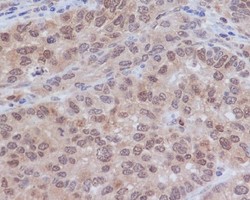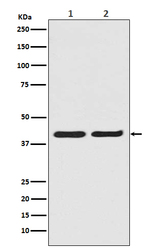M00030
antibody from Boster Biological Technology
Targeting: MAPK1
ERK, ERK2, MAPK2, p41mapk, PRKM1, PRKM2
Antibody data
- Antibody Data
- Antigen structure
- References [4]
- Comments [0]
- Validations
- Immunohistochemistry [1]
Submit
Validation data
Reference
Comment
Report error
- Product number
- M00030 - Provider product page

- Provider
- Boster Biological Technology
- Product name
- Anti-ERK2 Monoclonal Antibody
- Antibody type
- Monoclonal
- Description
- Rabbit IgG Monoclonal antibody for P28482 detection. Tested positive for WB IHC IF/IF IP FC in Human Mouse Rat
- Reactivity
- Human, Mouse, Rat
- Host
- Rabbit
- Antibody clone number
- II-13
- Vial size
- 100ug
- Concentration
- 0.5-1mg/ml, actual concentration vary by lot. Use suggested dilution ratio to decide dilution procedure.
- Storage
- Rabbit IgG in phosphate buffered saline, pH 7.4, 150mM NaCl, 0.02% sodium azide and 50% glycerol. Store at +4°C short term. Store at -20°C long term. Avoid freeze / thaw cycle.
Submitted references Molecular Mechanisms Associated with Protecting IEC-6 Cells from Acrylamide-Induced Tight Junction Damage by Ganoderma atrum Polysaccharide.
Ameliorative effects of epigallocatechin-3-gallate nanoparticles on 2,4-dinitrochlorobenzene induced atopic dermatitis: A potential mechanism of inflammation-related necroptosis.
MicroRNA181c inhibits prostate cancer cell growth and invasion by targeting multiple ERK signaling pathway components.
Icariin and icaritin stimulate the proliferation of SKBr3 cells through the GPER1-mediated modulation of the EGFR-MAPK signaling pathway.
Lu J, Yang Y, Varga E, Marko D, Yu Q, Xie J, Li C, Chen Y
Molecular nutrition & food research 2023 Mar;67(6):e2200774
Molecular nutrition & food research 2023 Mar;67(6):e2200774
Ameliorative effects of epigallocatechin-3-gallate nanoparticles on 2,4-dinitrochlorobenzene induced atopic dermatitis: A potential mechanism of inflammation-related necroptosis.
Han M, Wang X, Wang J, Lang D, Xia X, Jia Y, Chen Y
Frontiers in nutrition 2022;9:953646
Frontiers in nutrition 2022;9:953646
MicroRNA181c inhibits prostate cancer cell growth and invasion by targeting multiple ERK signaling pathway components.
Su Z, Zhang M, Xu M, Li X, Tan J, Xu Y, Pan X, Chen N, Chen X, Zhou Q
The Prostate 2018 Apr;78(5):343-352
The Prostate 2018 Apr;78(5):343-352
Icariin and icaritin stimulate the proliferation of SKBr3 cells through the GPER1-mediated modulation of the EGFR-MAPK signaling pathway.
Ma HR, Wang J, Chen YF, Chen H, Wang WS, Aisa HA
International journal of molecular medicine 2014 Jun;33(6):1627-34
International journal of molecular medicine 2014 Jun;33(6):1627-34
No comments: Submit comment
Supportive validation
- Submitted by
- Boster Biological Technology (provider)
- Main image

- Experimental details
- IHC analysis of MAPK1 using anti-MAPK1 antibody (M00030).MAPK1 was detected in paraffin-embedded section. Heat mediated antigen retrieval was performed in citrate buffer (pH6, epitope retrieval solution) for 20 mins. The tissue section was blocked with 10% goat serum. The tissue section was then incubated with 1ug/ml rabbit anti-MAPK1 Antibody (M00030) overnight at 4°C. Biotinylated goat anti Rabbit IgG IgG antibody was used as secondary antibody and incubated for 30 minutes at 37°C. The tissue section was developed using Strepavidin-Biotin-Complex (SABC)(Catalog # SA1022) with DAB as the chromogen.
- Additional image

 Explore
Explore Validate
Validate Learn
Learn Western blot
Western blot Immunohistochemistry
Immunohistochemistry